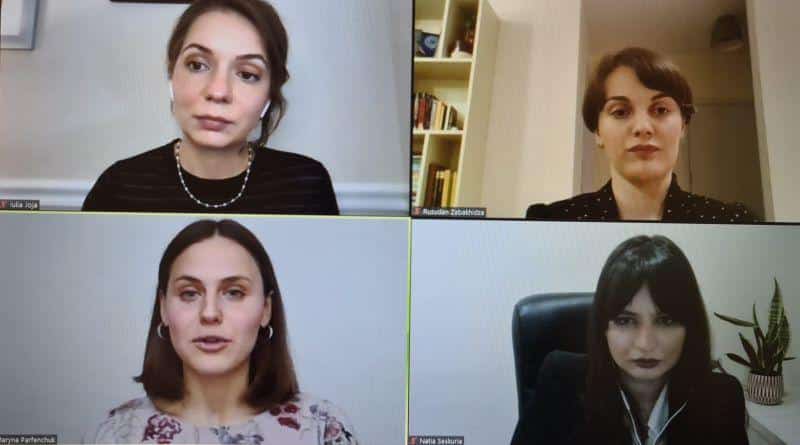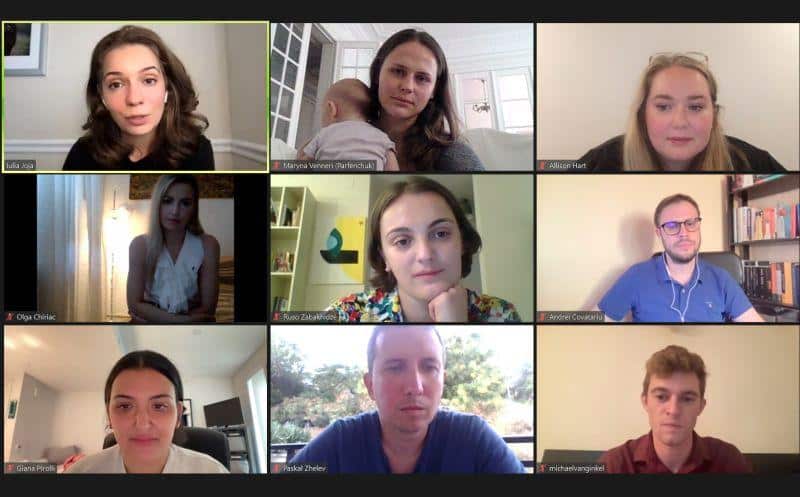
Growing up in this geopolitically important region of Europe not only shaped Maryna Parfenchuk’s interest in international relations but also inspired her to help shape policy for the region. She wanted to be able to use her language skills, cultural expertise, and insider knowledge to help world leaders make complicated decisions. This led her to The Middle East Institute’s Black Sea Research Fellowship.
The fellowship examines the strategic importance of the Black Sea region and its security concerns. The Black Sea region, part of Eastern Europe and the Caucasus, divides Russia, Eastern Europe, and the Middle East. Because of its location, the region plays an important role in international trade, security, energy, and political relationships. The Middle East Institute aims to bolster U.S. understanding of the region while also building connections within it.
Keep reading to learn more about Maryna’s experience in the program!
1. Tell us about your background and professional journey. What led you to the Black Sea Research Fellowship?
My academic background is in International Relations and Geopolitics. I studied Liberal Arts and Sciences at University College Roosevelt which is a part of Utrecht University in the Netherlands and I specialized in Political Science and Sociology. During my double Master’s degree, I had an opportunity to experience two universities at the same time. For the first year, I studied at LUISS Guido Carli in Rome and focused on European Studies where I mostly looked at the security and defense of the European Union as well as chose to specialize in Eastern Partnership countries. During my second year, I studied Security Studies and Political Sociology of Civil Wars at the University of Sheffield in the UK, where, once again, I specialized in conflicts that have happened or are currently happening in Eastern Partnership countries.
Once I graduated, I was looking for opportunities to continue producing high-quality research and adding to the current policy debates. The ability to use my voice and expertise was important because I speak the local languages and I come from Ukraine, one of the Eastern Partnership countries. That’s when I came across the call for applications for the Black Sea Research fellowship at Middle East Institute in Washington D.C.
2. Can you describe what a week in the life of a Black Sea Research Fellow is like? How did this opportunity allow you to advance your career and expand your professional network?
The format of the fellowship had to be revised when the first cohort was formed because it was the most active phase of the COVID-19 pandemic at that time. So, it was decided that the fellowship would be non-residential and all fellows were going to work from home and connect via a Zoom meeting every week. Those Zoom meetings not only served as a check-in point but also as learning opportunities. Every week, speakers from the Middle East Institute spoke about a specific topic within the Black Sea security subject. We were really provoked to think about how Black Sea security is so fundamental, not only to a specific country but to global and geopolitical security balance as a whole. For example, we had speakers who specialized in the Middle East region and who still could make a great point of intersectionality, showing how the Black Sea is crucial for the region far beyond Eastern Europe.
Throughout the rest of the week, we stayed in touch with the other fellows and with our supervisor Iulia-Sabina Joja to produce one policy article per month that was published on the MEI website.
3. The Black Sea Research Fellowship program aims to strengthen U.S. expertise and understanding of Black Sea countries while facilitating mutual connections between Americans and their regional counterparts. How did this mission shape your research project?
The mission of the first cohort of the Black Sea Research fellows has really been close to my heart because it was only the citizens of the countries that lie within the Black Sea that could participate in this program. To have a Washington D.C.-based think tank provide a paid fellowship to third-country nationals to actually bring their voices closer to Congress and White House policy-makers is something exceptional and very rare to see. So, the idea of the program was to give a voice to the region by inviting researchers who are natives of this region to share their perspectives on the security issues in the area. We were very encouraged and supported in speaking our minds and sharing what we have to deal with on a daily basis when it comes to security issues in our respective countries. We were also given complete freedom to find an angle or topic on which we wanted to write our monthly articles as well as the final research project.
In my case, coming from Ukraine and being able to understand the language and culture was my strongest asset and served as a foundation for my chosen research topics. I wrote about the significance of the maritime industry in Ukraine and beyond, provided policy recommendations for the US to have an effective Black Sea strategy in Ukraine, and outlined the window of opportunity to strengthen the Black Sea security in Ukraine due to the COVID-19 pandemic. Because I was able to embed my origin into the research, I felt empowered to share my views as an ‘insider’ with the ability to represent my country and explain the national phenomena in depth.
The second cohort of fellows operated under a bit of a different mission because they were all U.S. citizens who were given a grant by the U.S. Department of State’s Program for Research and Training on Eastern Europe and the Independent States of the Former Soviet Union (Title VIII). Selected fellows were given an opportunity to go to the Black Sea region themselves and conduct field research that would become their final research project. The difference in mission for the new cohorts is equally important as it provides an opportunity for U.S. citizens interested in the Black Sea region to deepen their understanding of cultural, social, political, and economic realities by directly interacting with the people from the region through field research. It also allows the new cohorts of fellows to empower local communities in Eastern Europe through their research and bring voices from the region to the U.S.

4. What advice do you have for others applying for the Black Sea Research Fellowship?
Apply without hesitation because it’s a great opportunity for you to not only meet like-minded people but also to create a support network for your writing and for your worldview. I was very surprised and eternally grateful when many people from my fellowship class reached out to me when the war in my home country, Ukraine, started on February 24, 2022. The Black Sea Research Fellowship is an opportunity that provides a community, and you should take this chance to address core U.S. foreign policy objectives by immersing yourself in the region, its people, culture, and political thinking.
Interested in applying? Bookmark The Black Sea Research Fellowship to your ProFellow account.

A career in international affairs is both rewarding and challenging. Fellowships provide a great opportunity to get your foot in the door, build a network, and gain experience. Learn how fellowships can launch your international affairs career.
© ProFellow, LLC 2022, all rights reserved.